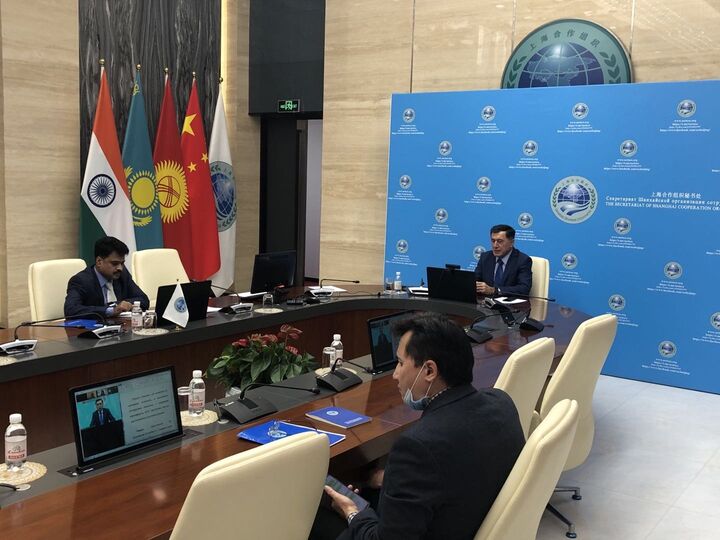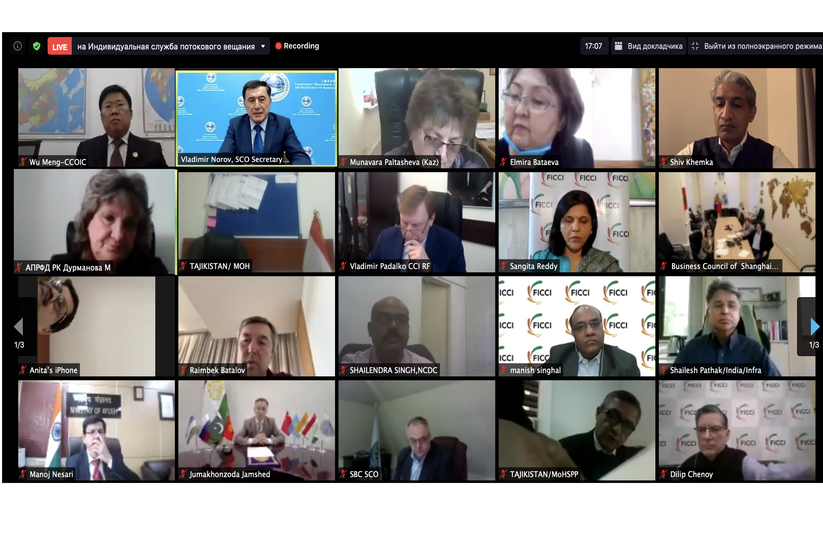The SCO Business Conclave "Higher economic sustainability and regional complementarity" organised by the SCO Business Council's National Chapter of India was held on 23 November, 2020.. The forum was attended by over 200 government officials, business and scientific representatives, entrepreneurs and experts on trade and industry.
SCO Secretary-General Vladimir Norov gave a speech at the forum. He noted the results of the SCO Heads of State Summit held on 10 November 2020 and the fact that the SCO was an efficient venue for mapping out collective measures to overcome the epidemiological, political, and socio-economic consequences of the pandemic in the Shanghai Spirit, despite COVID-19 related difficulties.
The heads of state endorsed a plan of action for 2021 ̵ 2025 on implementing the SCO Development Strategy until 2025, which has actually become the SCO's roadmap.
"It provides for implementing about 150 practical measures in the range of multifaceted cooperation, which are aimed at ensuring the post-pandemic economic recovery of the SCO member states as soon as possible and further invigorating their versatile trade and economic cooperation.
"In the Moscow Declaration adopted at the summit, the leaders of our countries expressed support for the further promotion of cooperation in trade, manufacturing, transport, energy engineering, finance, investment, agriculture, customs, telecommunications, IT, innovation and other spheres of mutual interest with a view to open, inclusive, innovative, green and sustainable development," Mr Norov said.
He mentioned new opportunities that have opened due to the pandemic-triggered crisis, mainly the acceleration of the digital transformation in practically all areas of socio-economic life.
"In 2019, global online retail sales totaled $3.5 trillion. That figure is expected to reach almost $5 trillion ($4.87 trillion) by 2021, or 17.5 percent of all retail sales," Mr Norov said.
Obviously, the advantages of the digital economy and cross-border e-commerce will become a major element of the global economic recovery. They will encourage social mobility and ensure broader economic participation from marginalised strata, Mr Norov noted.
The experience of the Alibaba Group shows that the digital economy is instrumental in opening new opportunities and encouraging inclusive growth. The corporation has created over 46 million direct and indirect jobs in China and granted opportunities to tens of millions of small and medium companies and startups to do business via its platforms. This allows small and medium businesses to engage in cross-border e-commerce and export their goods to China.
The Programme of Multilateral Trade and Economic Cooperation of the SCO member states, endorsed at the SCO Heads of Government Council in Tashkent in
November 2019, opens the way to comprehensive multi-sector cooperation with reliance on digitisation and high technology.
This is why digital literacy is an urgent issue for the SCO member states today.
In this context, President of Uzbekistan Shavkat Mirziyoyev suggested drafting a programme of cooperation to develop digital literacy, at the SCO Moscow summit. ASEAN has come up with a similar document entitled the Digital Initiative.
"We hope the SCO Business Council will initiate the development of cooperation programmes on developing digital literacy and cross-border trade in the SCO space. The SCO Secretariat is willing to do whatever it can to support this project," Mr Norov said.
He noted the important role and unique character of traditional medicine, especially in countering the COVID-19 epidemic.
Mr Norov commented on the speeches made by President of the PRC Xi Jinping and Prime Minister of India Narendra Modi at the SCO summit, on the importance of folk medicine and invigoration of mutual exchanges of knowledge and experience. He noted India's proposal to establish a working group on traditional medicine with a view to spreading knowledge about this ancient tradition and its subsequent introduction into the achievements of modern medicine.
In this context, the SCO Secretary-General praised the results of the SCO Traditional Medicine Forum (30 July 2020) and the seminar on cooperation in traditional medicine (22 September 2020) conducted by both countries. Mr Norov noted the willingness of the participants to pool efforts for upgrading public healthcare in the SCO space and suggested drafting a programme for multilateral cooperation on developing traditional medicine in the SCO countries.
The participants in the forum exchanged views on further economic cooperation and the development of sectoral ties in the SCO in the context of implementing SCO economic priorities. They discussed measures on enhancing business activities and strengthening the common economic structure of the SCO states in the post-pandemic period.

